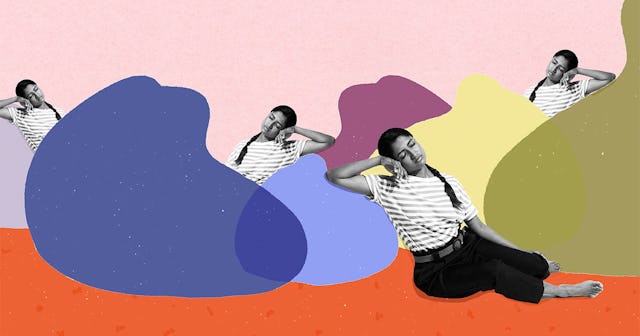People Started Taking More Naps During Lockdown––Here's Why This Is A Good Thing

Everyone reveres Idris Elba, whether he’s Heimdall, Luther, Macavity, or Fluke. I used to love him too, but I’ll tell you why I don’t like Elba so much anymore. I watched his “Work More, Sleep Less” video. It’s not just that he is starring in a motivational video (not my favorite film genre); it’s that the guy grinds on as little as two hours of sleep per night–and he’s telling me about it. He may accomplish unimaginable feats during those formidable 1320 waking minutes, but give me a break.
Motivational speakers, in general, must get a kickback from stimulant-disseminating pharmaceutical companies, because they’re always scoffing at my favorite pastime. If you want to triumph, they squawk, you’ve got to renounce your slovenly sleep habits and commit to a self-flagellating slumberless existence!
Lifehack contributor Casey Imafidon and Elba would get along swimmingly, maybe even share a Red Bull before their collective 14 minutes of sleep. In his article “7 Reasons Why People Who Sleep Less Are More Productive,” Imafidon makes the claim that, if you devote fewer hours to sleep, you can “achieve something worthwhile.” To prove his point, Imafidon refers to “the many great people [who] could sleep less and achieve so much in a lifetime” (he is referencing some of history’s amazing minds, like da Vinci and Einstein). But what Imafidon is forgetting is that not many of us are equivalent, in form or function, to those “great people” he refers to. When I think about compromising my sleep for the sake of producing an oeuvre of victories, I think of Mr. Magoo. Instead of being near-sighted, I’d be sleep-deprived, chugging through life and absent-mindedly mowing down whatever’s in front of me. I know I’m not alone.
Westend61/Getty
It’s not like the concept of getting good sleep is a new one. In fact, as the National Institute on Neurological Disorders and Stroke (NINDS) asserts, “Quality sleep–and getting enough of it at the right times–is as essential to survival as food and water. Without sleep you can’t form or maintain the pathways in your brain that let you learn and create new memories, and it’s harder to concentrate and respond quickly.”
So, what are the “right times?” Well, in the eyes of most of the world, the only acceptable time to sleep is at night. We are supposed to get 7-9 hours during those wee hours — but any sleep outside the boundaries of dusk and dawn is viewed with suspicion. As a siesta aficionado, I can tell you that daytime dozing is considered a luxury for the apathetic. Outsiders imagine that we partakers reluctantly wake up in the morning with a half-shut eye toward naptime. We keep satin blackout masks near our divans and slip them on … after we complete a cheesecake morning with nothing accomplished. Yes, in a world that values productivity, we nappers are viewed as slouches, prizing our couches over our work portfolios.
Ellen Wermter, a family nurse practitioner and spokesperson for the Better Sleep Council, doesn’t see things that way. She points out that “One of the ways sleep is regulated in humans is through the circadian process which gives us a boost to get through our evening routine. Right before that boost, however, is a natural dip in alertness. In most people this happens in the afternoon around 1-3 p.m. or 2-4 p.m. Some would argue that we are biologically designed to have a ‘down period’ during this dip and should use that period for rest.”
Did you hear that, nap haters? We snoozers are not giving in to our basest loafing instincts; our circadian rhythms are begging our bodies to wind down, so that we can wake refreshed and ready to take on the rest of the day.
Gonçalo Barriga/Getty
Now that I think of it, the word “refreshed” can be a little misleading. It calls to mind spearmint gum and commercials featuring bathing-suited models porpoising out of pools at Sandals resorts. In this case, we’re talking more about the kind of “refresh” a computer does — a kind of halting, resting, and re-setting. And that is exactly what your brain does when you allow it to have that 20-30 minutes (what Wermter calls “the sweet spot” for most people) respite.
The Covid months, when a percentage of the workforce relocated to the makeshift (and often very cozy) offices in their homes, taught us a bit about daytime dozing. This was the perfect time to investigate the benefits of catching a few midday winks. That rigid behind-the-desk workday morphed into one with a lot more flexibility — including the flexibility to sneak in a nap.
It doesn’t seem like there are many — or any — drawbacks to reinventing your day with a catnap scheduled in. According to Wermter, this quick reboot reduces stress levels, boosts mood, increases alertness and processing speed, while also improving memory. A calm, focused presence and accuracy at lightning speed? Sounds like trading that half-hour of drowsy, mentally-meandering work time for a quick doze could have been serendipitous. Wermter concurs: “The boost in productivity during lockdown could be attributed to a variety of factors, but napping is certainly a big contender for most influential.”
In his Bloomberg opinion piece, Michael R. Strain posits that “Some of the most productivity enhancing aspects of pandemic life will likely stick around, at least to some degree.” Wouldn’t it be lovely if a modest daily snooze could be one of them?
This article was originally published on